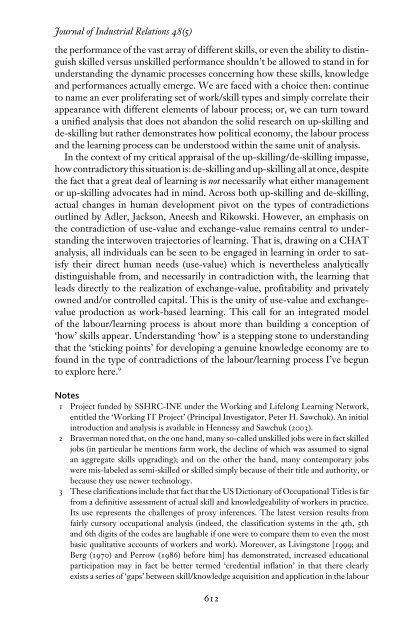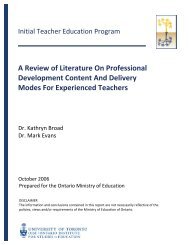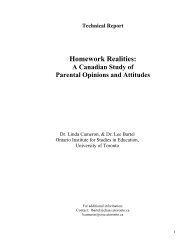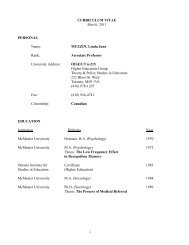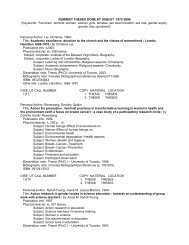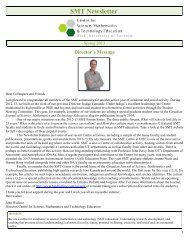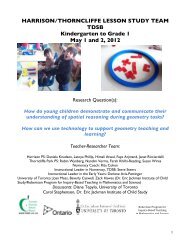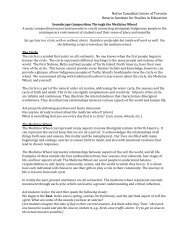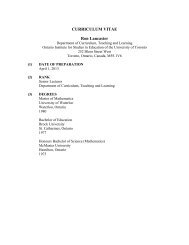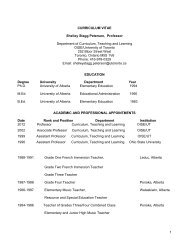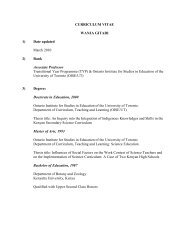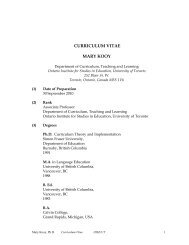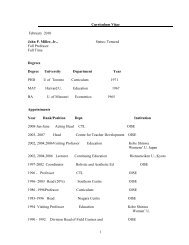'Use-Value' and the Re-thinking of Skills, Learning and the Labour ...
'Use-Value' and the Re-thinking of Skills, Learning and the Labour ...
'Use-Value' and the Re-thinking of Skills, Learning and the Labour ...
Create successful ePaper yourself
Turn your PDF publications into a flip-book with our unique Google optimized e-Paper software.
Journal <strong>of</strong> Industrial <strong>Re</strong>lations 48(5)<strong>the</strong> performance <strong>of</strong> <strong>the</strong> vast array <strong>of</strong> different skills, or even <strong>the</strong> ability to distinguishskilled versus unskilled performance shouldn’t be allowed to st<strong>and</strong> in forunderst<strong>and</strong>ing <strong>the</strong> dynamic processes concerning how <strong>the</strong>se skills, knowledge<strong>and</strong> performances actually emerge. We are faced with a choice <strong>the</strong>n: continueto name an ever proliferating set <strong>of</strong> work/skill types <strong>and</strong> simply correlate <strong>the</strong>irappearance with different elements <strong>of</strong> labour process; or, we can turn towarda unified analysis that does not ab<strong>and</strong>on <strong>the</strong> solid research on up-skilling <strong>and</strong>de-skilling but ra<strong>the</strong>r demonstrates how political economy, <strong>the</strong> labour process<strong>and</strong> <strong>the</strong> learning process can be understood within <strong>the</strong> same unit <strong>of</strong> analysis.In <strong>the</strong> context <strong>of</strong> my critical appraisal <strong>of</strong> <strong>the</strong> up-skilling/de-skilling impasse,how contradictory this situation is: de-skilling <strong>and</strong> up-skilling all at once, despite<strong>the</strong> fact that a great deal <strong>of</strong> learning is not necessarily what ei<strong>the</strong>r managementor up-skilling advocates had in mind. Across both up-skilling <strong>and</strong> de-skilling,actual changes in human development pivot on <strong>the</strong> types <strong>of</strong> contradictionsoutlined by Adler, Jackson, Aneesh <strong>and</strong> Rikowski. However, an emphasis on<strong>the</strong> contradiction <strong>of</strong> use-value <strong>and</strong> exchange-value remains central to underst<strong>and</strong>ing<strong>the</strong> interwoven trajectories <strong>of</strong> learning. That is, drawing on a CHATanalysis, all individuals can be seen to be engaged in learning in order to satisfy<strong>the</strong>ir direct human needs (use-value) which is never<strong>the</strong>less analyticallydistinguishable from, <strong>and</strong> necessarily in contradiction with, <strong>the</strong> learning thatleads directly to <strong>the</strong> realization <strong>of</strong> exchange-value, pr<strong>of</strong>itability <strong>and</strong> privatelyowned <strong>and</strong>/or controlled capital. This is <strong>the</strong> unity <strong>of</strong> use-value <strong>and</strong> exchangevalueproduction as work-based learning. This call for an integrated model<strong>of</strong> <strong>the</strong> labour/learning process is about more than building a conception <strong>of</strong>‘how’ skills appear. Underst<strong>and</strong>ing ‘how’ is a stepping stone to underst<strong>and</strong>ingthat <strong>the</strong> ‘sticking points’ for developing a genuine knowledge economy are t<strong>of</strong>ound in <strong>the</strong> type <strong>of</strong> contradictions <strong>of</strong> <strong>the</strong> labour/learning process I’ve begunto explore here. 9Notes1 Project funded by SSHRC-INE under <strong>the</strong> Working <strong>and</strong> Lifelong <strong>Learning</strong> Network,entitled <strong>the</strong> ‘Working IT Project’ (Principal Investigator, Peter H. Sawchuk). An initialintroduction <strong>and</strong> analysis is available in Hennessy <strong>and</strong> Sawchuk (2003).2 Braverman noted that, on <strong>the</strong> one h<strong>and</strong>, many so-called unskilled jobs were in fact skilledjobs (in particular he mentions farm work, <strong>the</strong> decline <strong>of</strong> which was assumed to signalan aggregate skills upgrading); <strong>and</strong> on <strong>the</strong> o<strong>the</strong>r <strong>the</strong> h<strong>and</strong>, many contemporary jobswere mis-labeled as semi-skilled or skilled simply because <strong>of</strong> <strong>the</strong>ir title <strong>and</strong> authority, orbecause <strong>the</strong>y use newer technology.3 These clarifications include that fact that <strong>the</strong> US Dictionary <strong>of</strong> Occupational Titles is farfrom a definitive assessment <strong>of</strong> actual skill <strong>and</strong> knowledgeability <strong>of</strong> workers in practice.Its use represents <strong>the</strong> challenges <strong>of</strong> proxy inferences. The latest version results fromfairly cursory occupational analysis (indeed, <strong>the</strong> classification systems in <strong>the</strong> 4th, 5th<strong>and</strong> 6th digits <strong>of</strong> <strong>the</strong> codes are laughable if one were to compare <strong>the</strong>m to even <strong>the</strong> mostbasic qualitative accounts <strong>of</strong> workers <strong>and</strong> work). Moreover, as Livingstone [1999; <strong>and</strong>Berg (1970) <strong>and</strong> Perrow (1986) before him] has demonstrated, increased educationalparticipation may in fact be better termed ‘credential inflation’ in that <strong>the</strong>re clearlyexists a series <strong>of</strong> ‘gaps’ between skill/knowledge acquisition <strong>and</strong> application in <strong>the</strong> labour612


